.
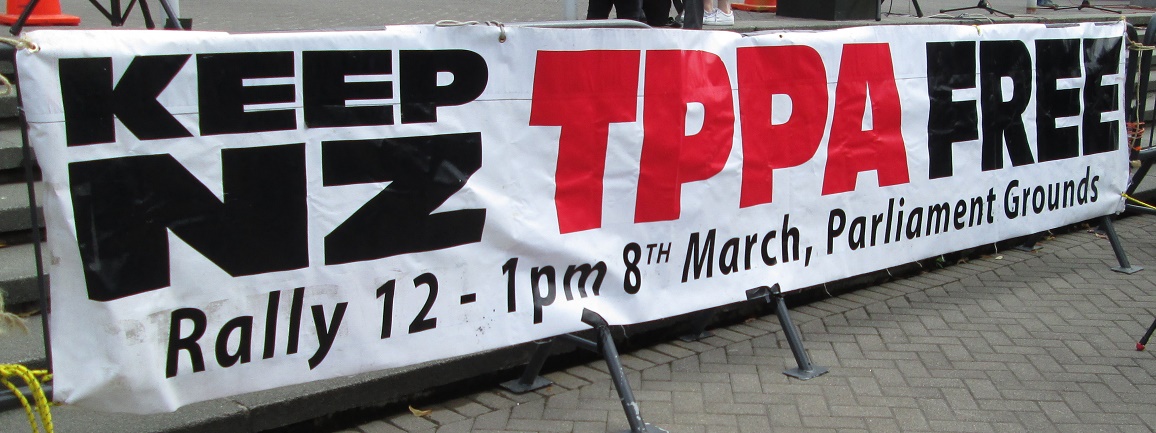
.
“Far too many New Zealanders have come to view today’s capitalism, not as their friend, but as their foe. And they are not all wrong. That is why we believe that capitalism must regain its responsible – its human face. That perception has influenced our negotiations.” – Winston Peters, 19 October 2017
.
8 March, Wellington, New Zealand: As Trade and Export Growth Minister David Parker flew to Chile to sign the TPPA in Santiago, around a hundred people gathered in Parliament’s grounds to oppose the Coalition government’s decision to accept the deal;
.
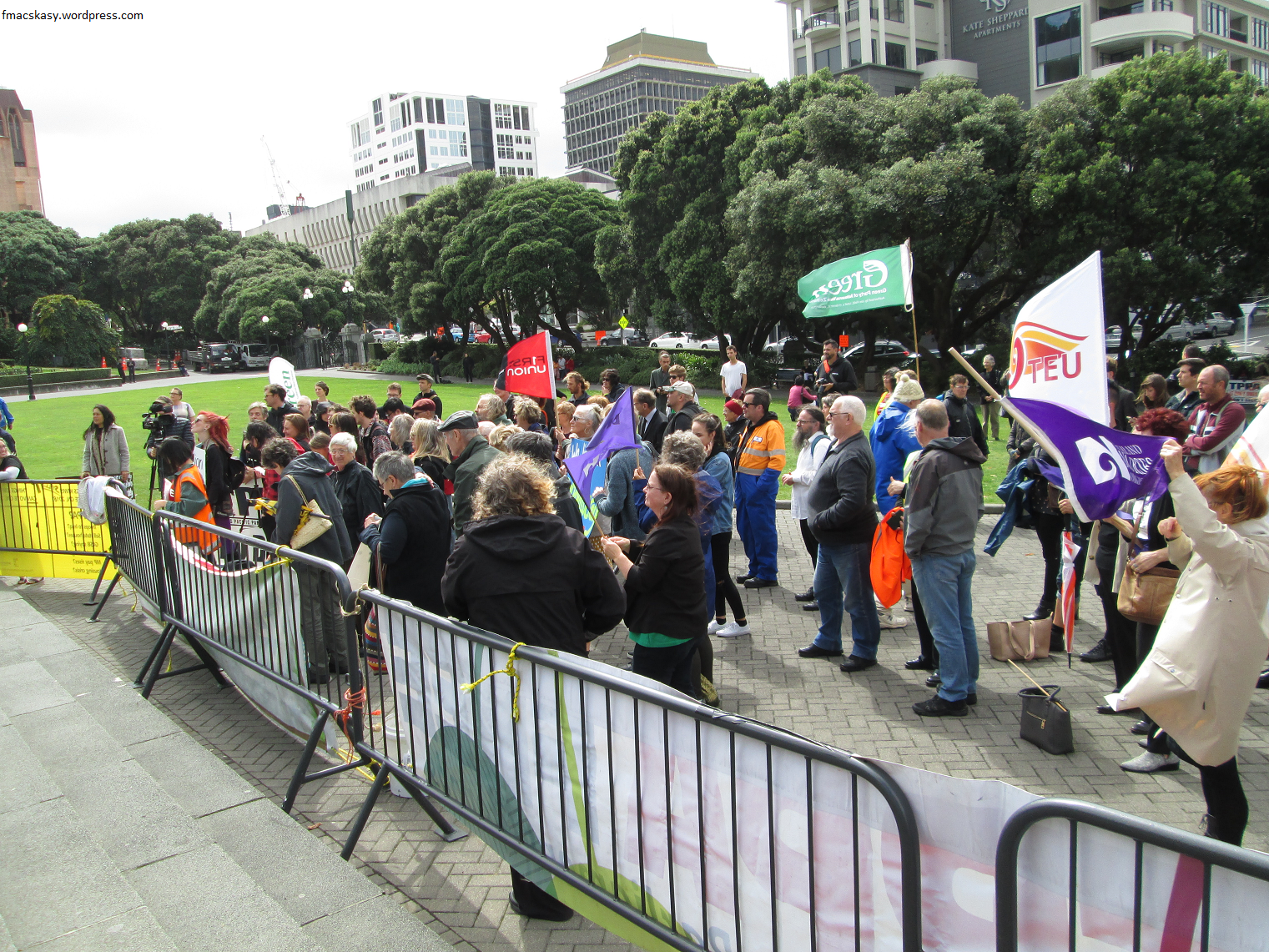
.
The message from speakers and the assembled people was best summed up with this message;
.
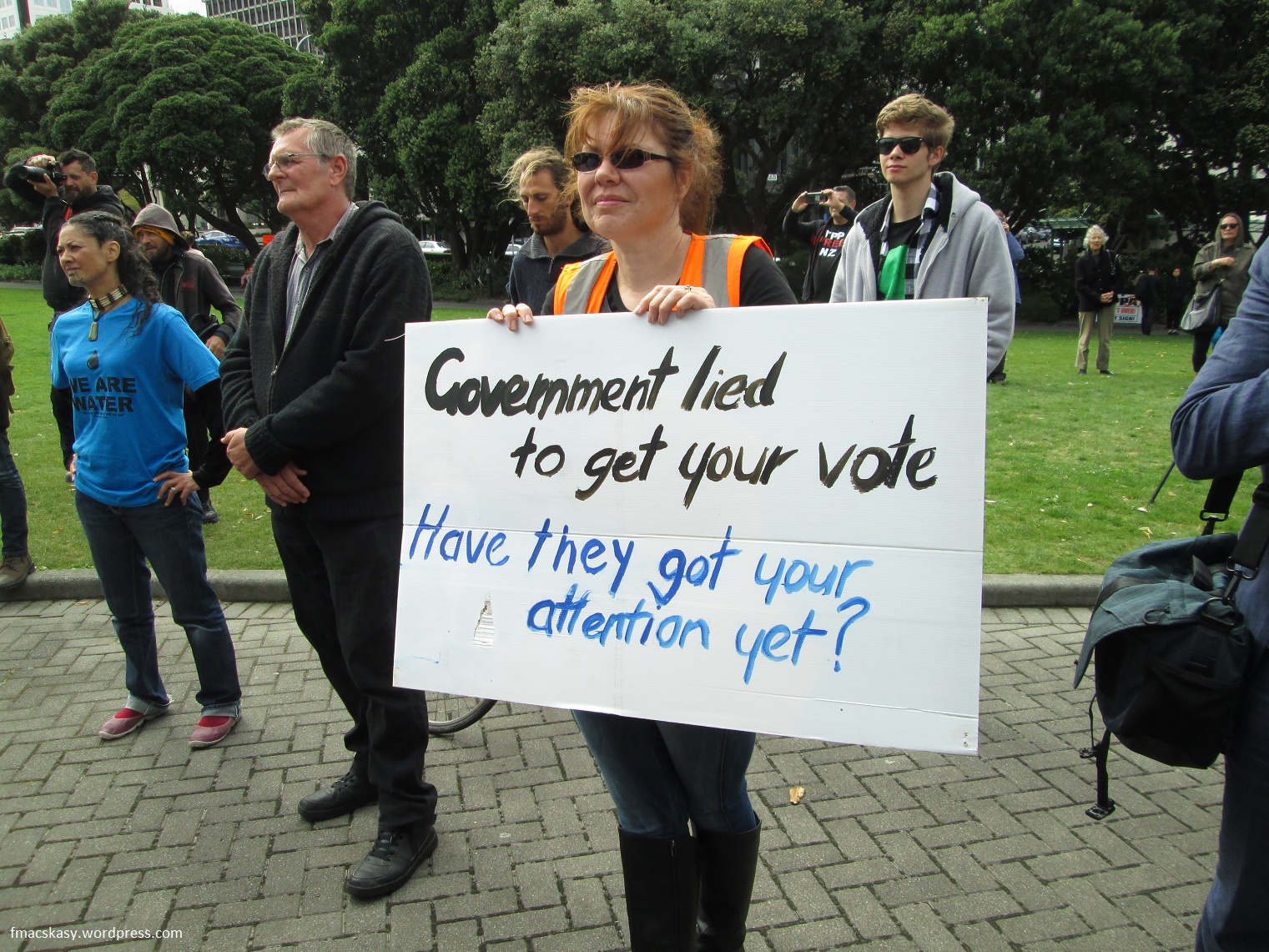
.
Grant Brookes, from the New Zealand Nurses Organisation was one of several speakers to address the protest. He was highly critical of the so-called “revised” agreement;
.
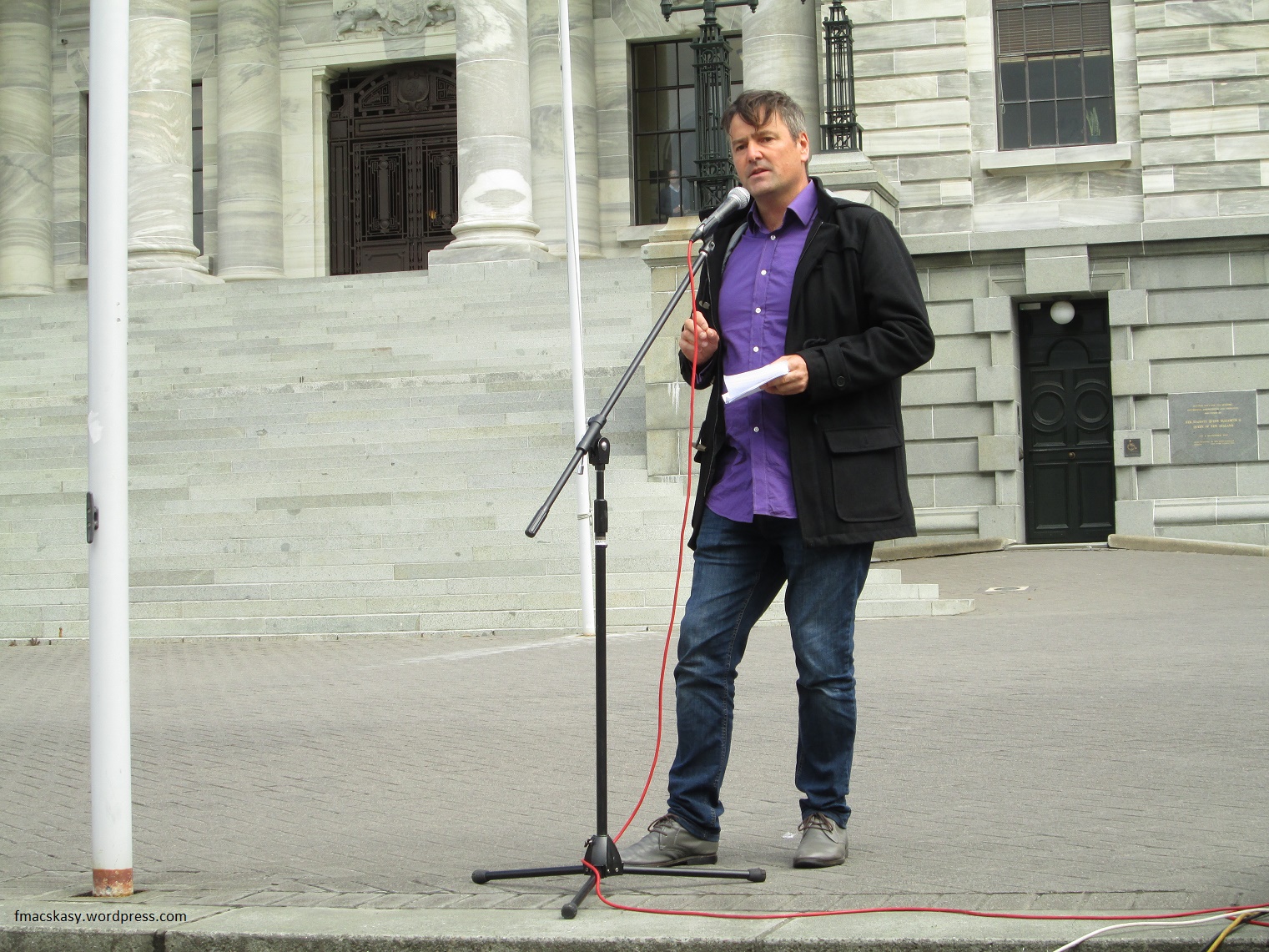
.
He said;
“The NZ Nurses organisation objects to this government’s intention to sign the Comprehensive and Progressive Trans Pacific Partnership Agreement in Chile later today. We assert that despite some improvements, the CPTTP is not ready to be signed. Trade Minister David Parker […] acknowledges that the deal is not perfect. Speaking on Newshub last week he said he would give it a score of seven out of 10 for New Zealand.
Let’s imagine for one minute that that score is accurate, but what does seven out of ten mean when it comes to your health?
[…]
What if you turned up to the Emergency Department with a serious cut, and you were told you could have stitches to seven tenths of your wound? What does it mean if you were in pain and you were given a treatment that left you 30% sore?”
On 3 March, Minister David Parker was interviewed by Lisa Owen for TV3’s The Nation. He told Ms Owen;
Lisa Owen: Yes, exactly. Scale of 1 to 10 – 10 being out of this galaxy, deal of the century – what grade do you give it?
David Parker: Probably a 7 to good, improved access into Japan, where beef exports have been dropping; they’ve dropped by 38 per cent recently because of Australian competition with lower tariffs. That’ll be fixed. Not an especially good deal for dairy but better than nothing, and relatively more important than it was before the attacks on the World Trade Organization architecture that are happening because of some other countries who seem to want to blow the system up.
Though Parker defended the signing of the agreement, he appeared lukewarm to the deal, adding;
“I don’t think it’s the best trade agreement; that’s why I gave it a seven.”
Parker’s lack of enthusiasm echoed criticisms made by Grant Brookes at the protest;
“Although there have been improvements, threats to population health and all that sustains it, remain in the text. There are, for example, intellectual property provisions which have been suspended but they are still there, and they could still delay access for new medicines.
The same is true for the Investor State Dispute Settlement provisions. They remain [in] the text. And these privileges benefit multinational corporations over our sovereign and indigenous interests.”
He specifically mentioned;
“The Treaty of Waitangi exception, as it’s called in the text, is not robust enough that indigenous rights are protected and is not consistent with the recommendations of the Waitangi Tribunal. This means that Maori efforts to address health disparities could be undermined.”
Perhaps one of the greatest criticisms of the trade agreement lay in it’s omissions;
“The environment chapter – it doesn’t even mention climate change which the World Health Organisation has called the greatest threat to global health in the 21st century.”
He added;
“The defenders of this deal […] point to possible economic gains, although no one is saying today these are going to be huge.”
Some estimates put any economic benefit to this country at around 1% of New Zealand’s economy – over time.
As if to underscore Grant’s list of flaws with the TPPA, this protestor listed each one;
.
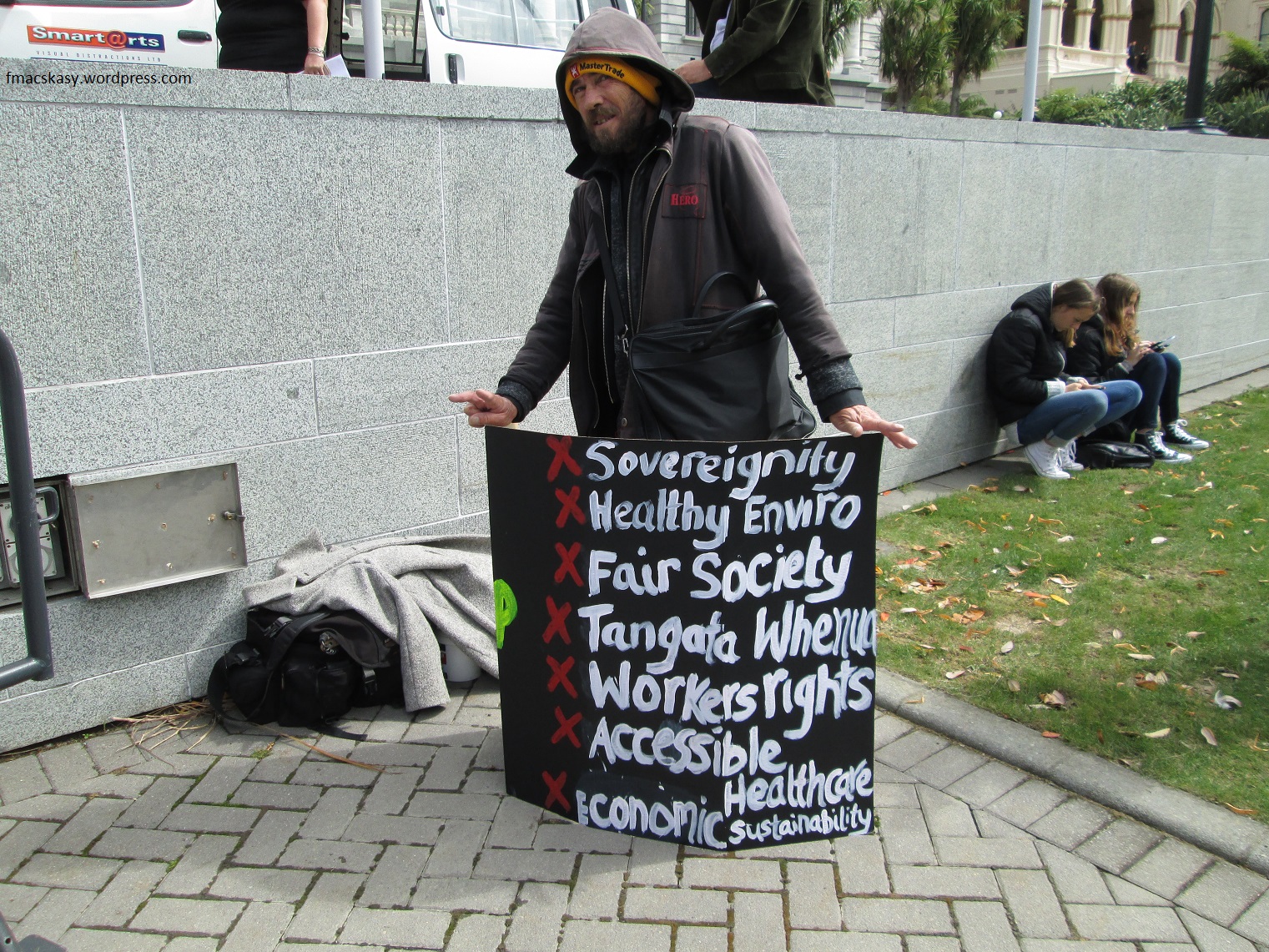
.
Following Grant was Rick Zwann, from Action Station;
.
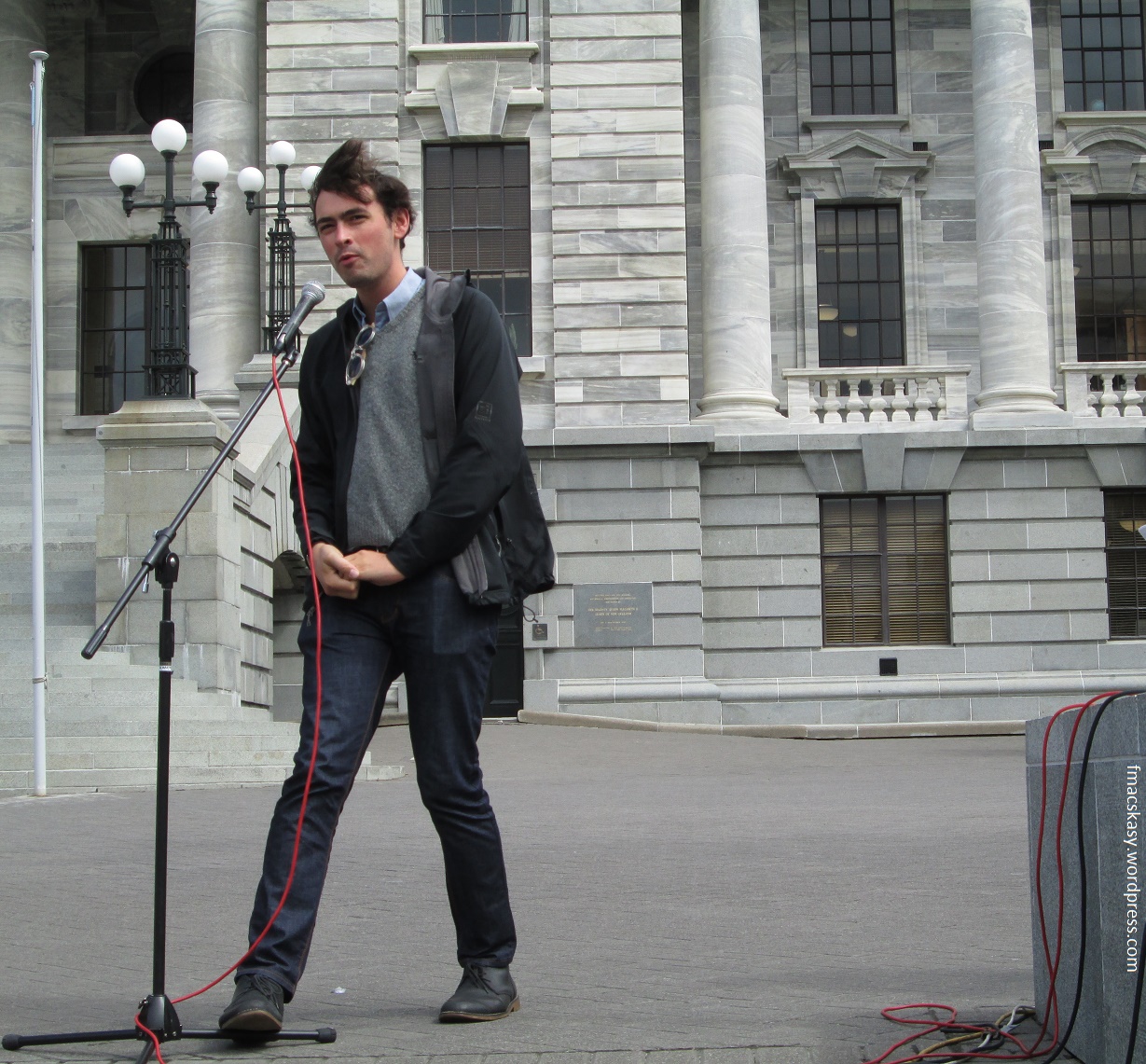
.
Rick pointed out the large number of Labour MPs who had attended anti-TPPA protests in previous years, and who were now nowhere to be seen. He also pointed out some fairly basic flaws in the process by which National, Labour, and NZ First had signed up to the deal;
“When we did polling around this, 75% of New Zealanders wanted independent analysis of this agreement before it was signed. […] This is an issue that New Zealanders right across the board, no matter what political party they voted for, no matter their age, no matter their backgrounds, they want to know actually what this deal would do and mean for us.
They don’t trust the MFAT analysis that has happened which is basically a re-write of the analysis that happened for the initial agreement […] the analysis that many of the parties who now voting for it, heavily critiqued. It just makes sense that we should have some independent analysis so we’re able to really look at what this deal would mean for us.”
He added;
“It makes sense because if you’re buying a house […] you wouldn’t just trust what the real estate agent is saying. You’d go and get a builder to look at that house and give you an independent report on what that house would actually be like to live in. If you’re going to do that for an investment like a house, why wouldn’t you do that for something as massive as this agreement which affects all parts of our society and all parts of our economy?”
While Labour and NZ First were noticeably “missing in action” from the protest, the one party in Parliament to stay true to it’s pre-election commitments was prominent;
.
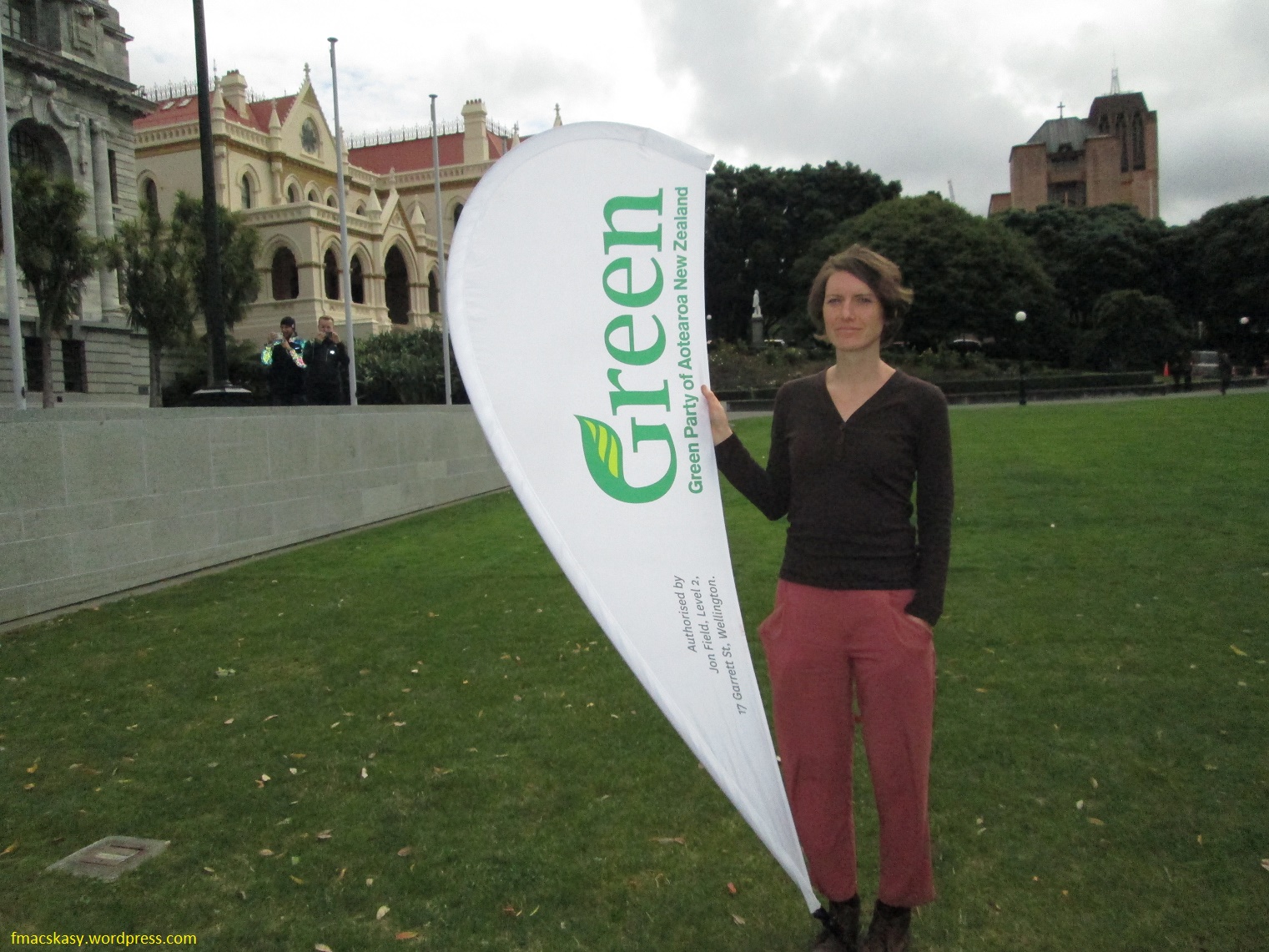
.
One thing that can be said about the Greens – they rarely back-track on what they say.
Following Rick, Lisa McLaren spoke for Generation Zero;
.
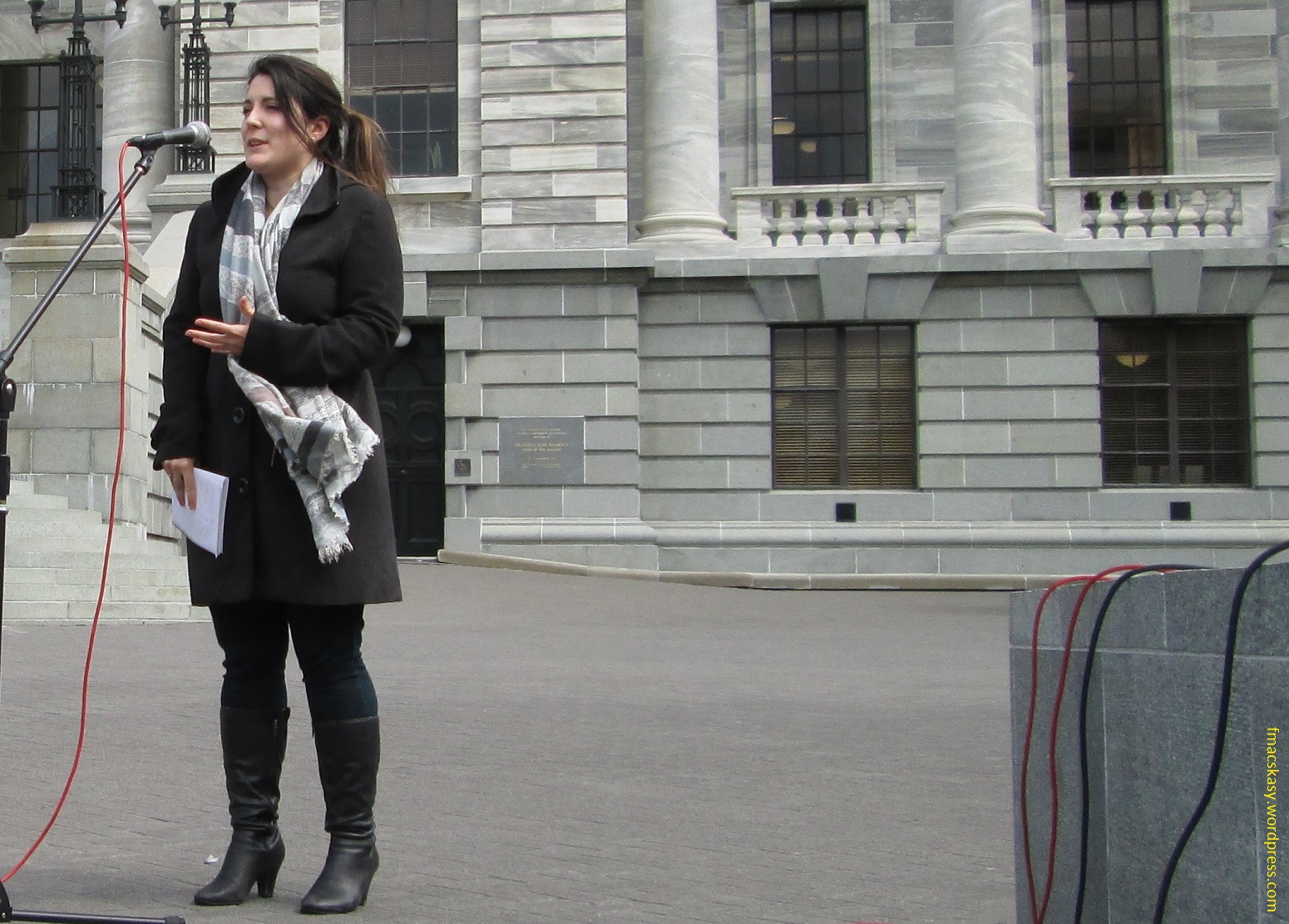
.
Lisa raised concerns how the TPPA would impact on climate-change legislation currently being drafted by the Coalition government. Her speech was brief but straight to the heart of the matter;
“We’re really lucky because the new government has come in and said they’re going to create this new climate law and they’re going to pass it through next year. In fact it’s being drafted across the road as we speak.
But we’re really concerned about what this new TPP deal will do to this new climate law. What policies are not going to be able to be put in place for future generations to reduce emissions. We’re really, really concerned that there hasn’t been any independent analysis […] We’re calling for the government if they do sign on, to go through that independent process before this deal is ratified. They have the opportunity to do that.”
Lisa raised the very real spectre of future generations being bound by a flawed international agreement;
“Personally, I’m worried about when my kids are in Parliament, I want them to aim for the stars and be the leaders. But I’m really really concerned by what they’re going to be bound by if we don’t get this right. So I’m calling on them to get it right, for my future.”
Other citizens had their messages for the Coalition government;
.
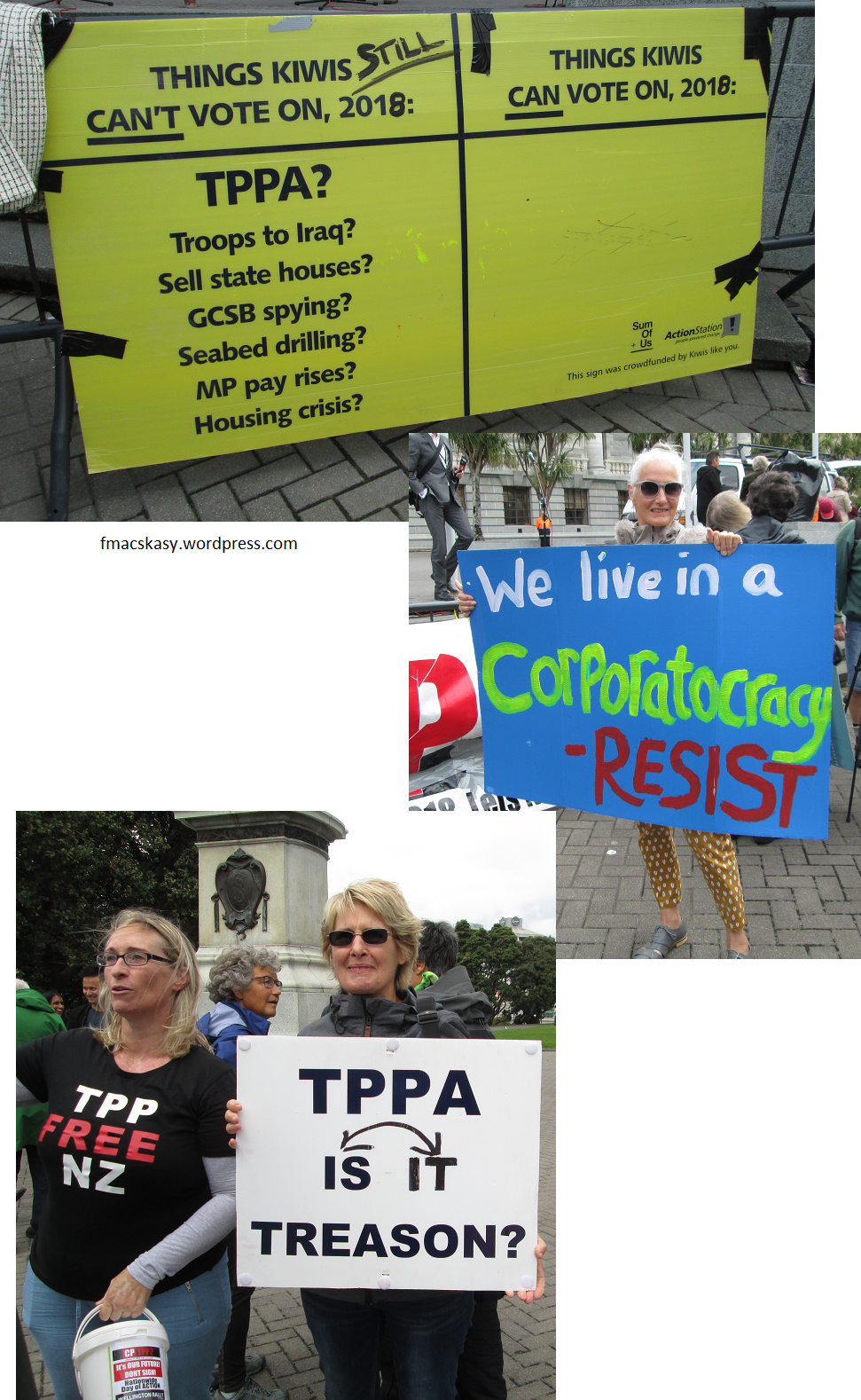
.
Exclusions?
On 9 March, Trade Minister David Parker announced that “side letters” had been signed with five participating nations of the TPPA, prohibiting investor-state dispute settlement (ISDS) lawsuits. The five are;
- Brunei Darussalam,
- Malaysia
- Peru
- Viet Nam
- Australia
Parker announced through a Beehive press statement;
“I’m pleased we have been able to make so much progress in just a few months. We haven’t been able to get every country on board, but signing letters with this many CPTPP partners is a real achievement.”
He added;
“A further two countries, Canada and Chile, have joined New Zealand in a declaration that they will use investor-state dispute settlement responsibly.”
A cynic (or realist) would immediately want to know the definition of what constitutes “using investor-state dispute settlement responsibly” ?
The real problem is that the TPPA has eleven signatories – not just the five listed above. The others are;
- Canada
- Chile
- Japan
- Mexico
- Singapore
Five countries have not agreed to signing “side letters” prohibiting ISDS lawsuits.
It would be a simple matter for a company to relocate it’s Head Office from a signatory-state to a “side letter” (eg, Peru) to a non-signatory state (eg; Mexico).
As Green Party leader James Shaw said on 21 February;
“There is the continued existence of the Investor-State Dispute Settlement mechanisms for some countries and that allows large multi-national companies to what we call ‘jurisdiction shop’ and simply locate where they still have that possibility.”
This is precisely what took place in November 2011, when tobacco corporation Philip Morris sued the Australian government to prevent implementation of plain-packaging laws;
Tobacco giant Philip Morris is suing the Australian government over a new law making plain packaging mandatory for cigarettes from December 2012.
Australia’s parliament has passed legislation that means all tobacco will need to be sold in plain olive-brown packets with graphic health warnings.
Canberra said the law was “one of the most momentous public health measures in Australia’s history”.
But Philip Morris Asia said the move breached a bilateral investment treaty.
It said it had served a notice of arbitration under Australia’s Bilateral Investment Treaty with Hong Kong.
[…]
Philip Morris Asia said it wanted the legislation to be suspended. It said it would ask for compensation for the billions of dollars it said the new law would cost it.
To carry out it’s law-suit under the 1993 Australia-Hong Kong Bilateral Investment Treaty, Philip Morris first had to move it’s registered office from Australia to Hong Kong.
Once that step was accomplished, Philip Morris had the legal right to sue the Australia government using the ISDS provisions of the Australia-Hong Kong Bilateral Investment Treaty. Which it did so in 2011.
After a protracted four year court battle, Philip Morris lost its case. But not before the Australian government spent an estimated A$50 million in taxpayers’ money to defend it’s sovereign right to pass health-related legislation. Philip Morris is resisting paying legal costs incurred by the Australian government.
Now imagine a New Zealand government having to stand up against a billion-dollar corporation and spend tens of millions of taxpayers’ dollars dollars to pass legislation to protect the health of it’s citizens.
If the previous National government’s timidity in the face of it’s own proposed plain-packaging legislation in 2016 was any indication, our own politicians may be extremely “risk averse” when it comes to confronting multi-nationals.
When asked if National would proceed with plain-packaging legislation in the face of potential billion-dollar lawsuits, then-Dear Leader, John Key responded;
“Late last year I asked for advice on that matter, and the advice I got back was that they felt we were on very firm ground and didn’t feel there was really any issues.”
“No real issues”? Yet Key was cautious enough to tread carefully on the fear-threat of possible litigation;
“It was waiting, and I think the view I initially took was given Australia was in the middle of this court case it probably didn’t make sense for us to embark on that, and then potentially face exactly the same costs for the taxpayer in defending another legal action.”
National revealed how risk-averse it was to litigation when it caved in the face of an alleged threat to be sued by Saudi Arabian businessman, Hamood Al Ali Al Khalaf ;
Foreign Affairs Minister Murray McCully told Parliament that Saudi businessman Hmood Alali Alkhalaf had a potential $20m-$30m lawsuit against the New Zealand Government, after he lost money when a ban on live exports for slaughter was continued.
The Government then spent $11.5m setting up a demonstration farm in the Saudi desert, including a $4m facilitation payment to Alkhalaf.
(Side-note: There is now a very real question hanging over Murray McCully’s assertions that the New Zealand government was in fact facing a multi-million dollar lawsuit from Al Khalaf . It has been suggested that McCully fabricated or exaggerated the whole story.)
New Zealanders have just cause to doubt whether their own government would have the intestinal fortitude to stand up to a multi-national with deep corporate pockets to launch a lawsuit against us.
We caved in the face of French demands to release two agents convicted of sabotage and murder.
We caved to (apparent) threats from Warner Bros to move production of The Hobbit to another country. (The threat turned out to be baseless – but it nevertheless succeeded in ‘spooking’ the public.)
We (apparently) caved to demands from a lone Saudi businessman.
And then there was this curious event in June 2013, when the Chinese government may have exerted heavy pressure on the National government over a proposed fta with Taiwan – an island-state it considers a “renegade province”;
.
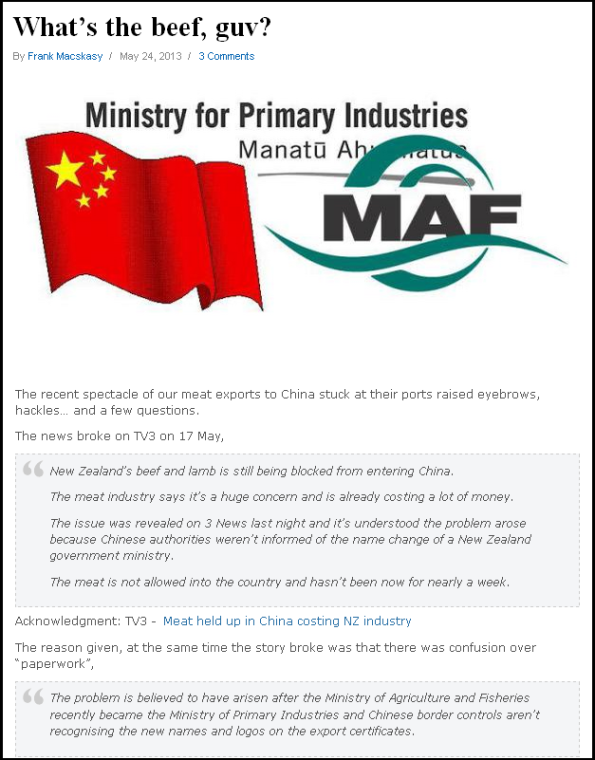
.
The frightening possibility is that we, the public, might never even know if the threat of litigation under ISDS clauses forced a government-of-the-day to comply with demands from a multi-national.
When it comes to political self-interest and corporate “commercial sensitivity”, we have the makings of a toxic brew of secret back-door machinations.
After all, the entire TPPA negotiation was conducted in secrecy. Not exactly an auspicious start for such a supposedly beneficial trade agreement.
And not exactly a good start for Labour and NZ First.
Postscript
At the protest, Bryan Bruce of “Inside Child Poverty” fame, conducting an interview for his latest documentary-project;
.
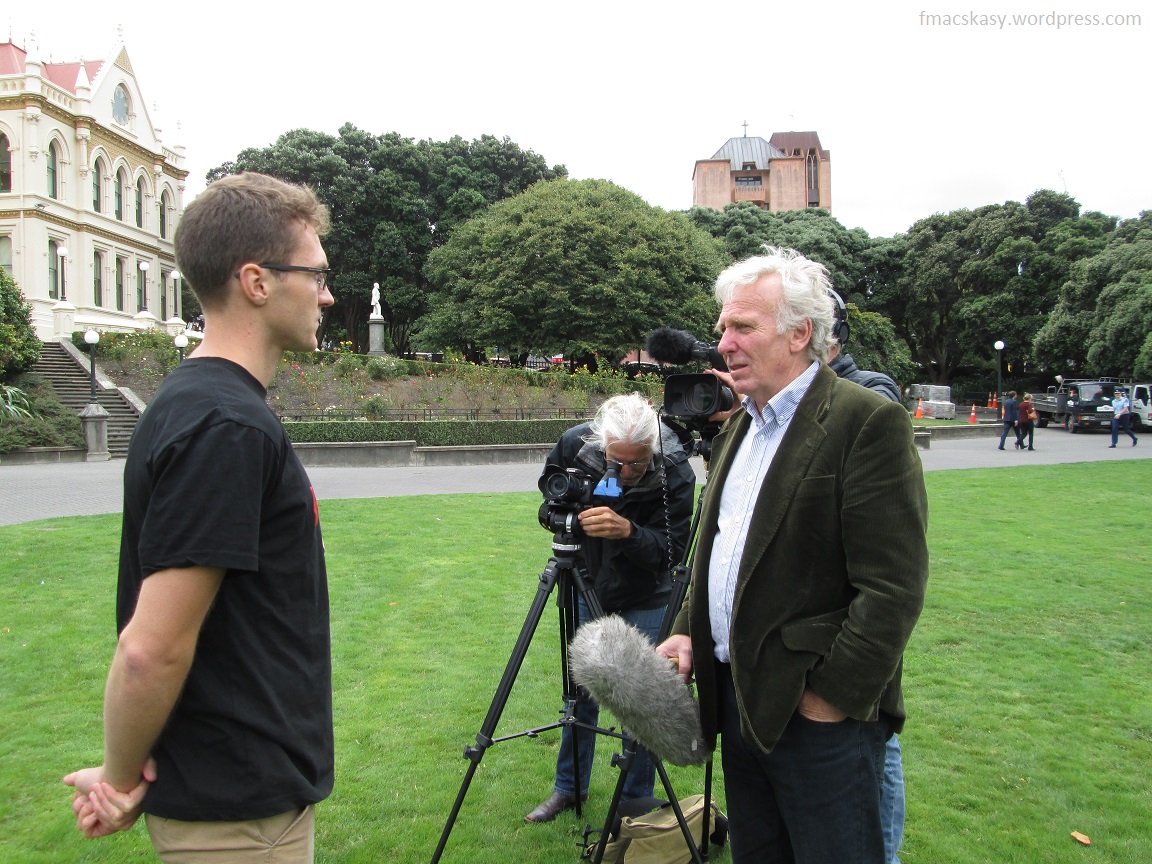
.
Based on his past documentaries exposing poverty, homelessness, and growing inequality, an exposé on the TPPA should prove illuminating for middle New Zealanders.
Thank the gods for independent documentary-makers. It will be refreshing to see an investigative doco on the TPPA, even if ‘sandwiched’ between “reality” tv shows such as My Kitchen Rules, Real Housewives of Eketahuna, The Block, Survivor ‘Wherever’, etc.
Refreshing indeed, to watch some real reality for a change.
.
.
.
References
Scoop media: Peters – Post-Election Announcement Speech
Radio NZ: New TPP deal signed by NZ in Chile
Scoop media: The Nation – Lisa Owen interviews David Parker
Radio NZ: New TPP deal signed by NZ in Chile
Beehive: New Zealand signs side letters curbing investor-state dispute settlement
Radio NZ: Greens remain opposed to TPP
BBC: Philip Morris sues Australia over cigarette packaging
NZDRC: 1993 Australia-Hong Kong Bilateral Investment Treaty
Sydney Morning Herald: Australia versus Philip Morris. How we took on big tobacco and won
The Guardian: Secrecy over costs in Philip Morris plain packaging case stokes TPP fears
Fairfax media: Tobacco plain packaging likely to be law by end of year – John Key
Fairfax media: Govt accused of telling Saudi businessman to sue
Radio NZ: Saudi sheep deal – MFAT didn’t provide legal advice on lawsuit risk
SBS News: NZ at risk of losing the Hobbit
NZ Herald: Sir Peter – Actors no threat to Hobbit
NZ Herald: Strong reaction to damning TV child poverty doco
Additional
Other Blogposts
The Daily Blog: Let’s be clear – when Labour & NZ First sign the TPPA this week – it will be as cheap traitors for less than 30 pieces of silver
The Daily Blog: Open letter to Trade Minister David Parker
The Standard: TPPA rally at parliament today
The Standard: March 8 2018 – the TPPA and our nuclear free moment
The Standard: TPP2 – Electric Boogaloo
Previous related blogposts
Doing ‘the business’ with John Key – Here’s How (Part # Rua)
Some thoughts on the Plain Packaging Bill
Public opposition grows against TPPA – Wellington
Key’s TPPA Falsehoods – “We’ve never, ever been sued” ***up-date ***
Citizens march against TPPA in Wellington, send message to National govt: “Yeah, nah!”
Citizens march against TPPA in Wellington: Did Police hide tasers at TPPA march?
The Mendacities of Mr Key # 15: John Key lies to NZ on consultation and ratification of TPPA
Taiwan FTA – Confirmation by TVNZ of China pressuring the Beehive?
Copyright (c) Notice
All images stamped ‘fmacskasy.wordpress.com’ are freely available to be used, with following provisos,
» Use must be for non-commercial purposes.
» Where purpose of use is commercial, a donation to Child Poverty Action Group is requested.
» At all times, images must be used only in context, and not to denigrate individuals or groups.
» Acknowledgement of source is requested.
.
.
.

.
.
= fs =

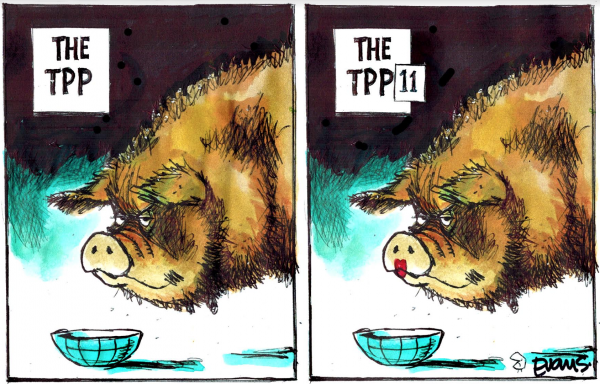




The critical point is thatISDS provisions have not been deleted totally from the TPP. They’ve only been “set aside”. Which means they can be reinstated fully at any time.
This is what Labour have signed NZ up to and they is the betrayal.
NEver again will I support Labour. NEver ever.
I’m pretty pleased it’s signed and must say surprised that it was signed with Labour and NZ1st so against it in the run up to the election. I’m not disappointed as I didn’t vote for Lab/NZ1, but I sure would be if I was against the deal and voted for Lab or NZ1st, but that’s politics I guess. You can never agree with 100% of a parties policies (unless a sycophant of course) but if you agree with a %age higher than you agree with the other parties then that’s your vote choice, some you win and some you lose and as far the left goes the TPPA is a lose, and funny how Jacinda and Winnie were out of the country when it was signed 🙂
Agree 100%
Also the ecommerce laws are designed to circumvent privacy of Kiwi’s data. and also conveniently means that records of Kiwis such as medical records or criminal records can be kept offshore.
What got the EU residents up in arms was the ability for their ‘social’ services to be outsourced.
Trade agreements around the world have already killed worker jobs or lowered the wages to below liveable levels, now the managerial jobs are cleared to go offshore for health, police, defence, councils, education etc.
Our Labour and NZ First government just signed that one away for future jobs in this country.
If you don’t like it, don’t forget government are not allowed to give preference to their own countries under these trade agreements.
All this so that beef exports may be increased because of the decline. Maybe that’s also because Silver Fern is under new Chinese management and Japan does not like it, there’s a million reason’s it could be, a rise in bowel cancer, vegetarianism, not just Australian tariffs and no reason to assume anything is gonna change by signing a ridiculous agreement that they know is going to take jobs away from this country!
I think CleanGreen described his local council as ‘demented’ because they refused to fund public services like rail because ‘they could not afford it’ while spending millions on new/upgraded council premises.
Demented is the word that describes these government idiots who are so impractical and without any inkling of creative brain matter to be able to envision a future with the clauses and risks of their own deals they spend millions on organising to sign and cheerlead against their own interests.
But, but, but, we can export more BEEF to Japan in future, ‘green BEEF’, I suppose, grown from ‘green’ grass, in ‘clean green NZ Inc’.
The Japanese will love it, and may offer us whale meat exports in return?!
If we want free trade to be a force for good we must raise PPP (purchasing power parity) so that the average wage is high enough that it dosnt matter if the economy is struggling along at 1%-3% growth.
As a seventy two year old who marched against the tppa, i almost threw up this morning listening to labour mouthpiece williams on rnz nat. denigrating the few people who turned up at the weekend demonstration at parliament, his position being that the barely unchanged agreement was a great outcome and that nobody cared anymore!!! Well i have news for mr. williams, i am sick of voting for lying a holes who say one thing until elected and then do the complete opposite !!! Before the election i looked at the peters party, but as it turns out i correctly reasoned that he was not to be trusted, and the jones addition just settled it. Having been a left leaning voter all my life, i would never bring myself to vote tory so it looks like my only option is to join the ever growing number of non voters
Vote Green or Mana as a protest vote G.A.P. It will send Labour and National more of a message!
While the possible impacts of signing the TPP are real and the potential benefits within the margin of error of a GDP prediction there are real costs to challenging the rules of the game…especially when youre only there to make up the numbers.
We can choose to point out the emperor has no clothes but dont be surprised if the emperor decides to banish us in response.
Screw the people. Screw the environment. Ensure that banks and corporations (and opportunists) get what they want.
That’s what government is……. the agency set up to screw the people and screw the environment and ensure that banks and corporations and opportunists get what they want.
Labour…..National,,,,NZ…., it makes no difference. They’re all the same, all ‘singing the same songs from the same hymnbook’….the Book of Dysfunction.
Don’t ever expect anything other than betrayal and incompetence from the government; that way you will not be disappointed.
[…] blogpost was first published on The Daily Blog on 12 March […]
Comments are closed.